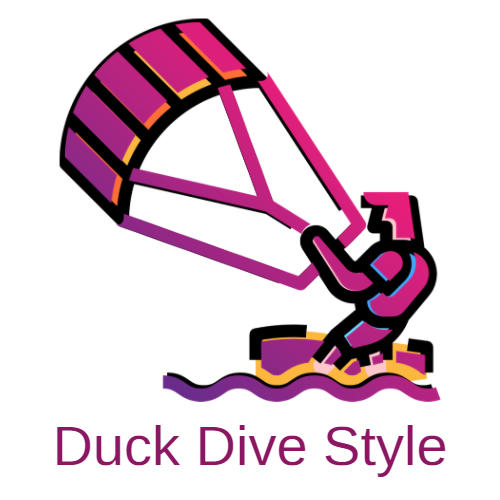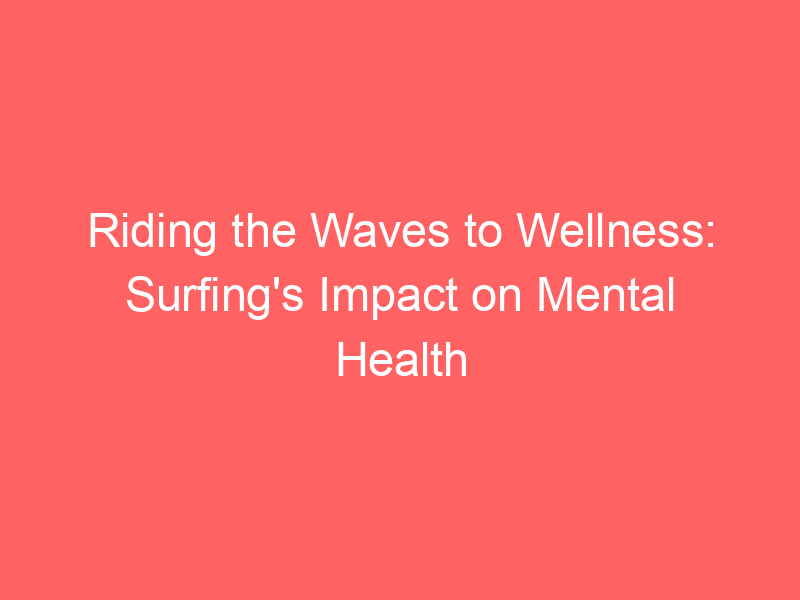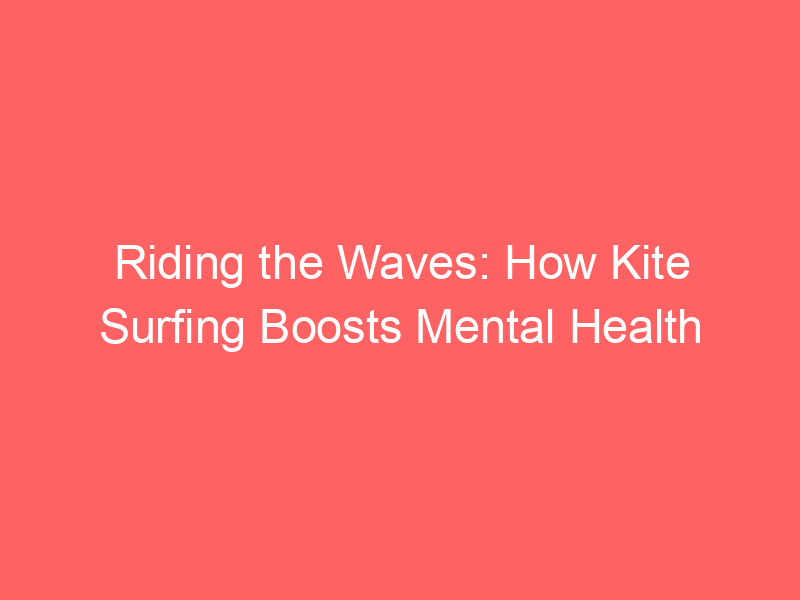
Introduction: Surfing as a Mental Health Treatment
Surfing, a popular water sport, is not just about riding the waves for fun. It’s also emerging as a powerful tool in promoting mental health. In this blog post, we will explore the rise of surfing therapy and understand the mental health benefits it offers.
- The Rise of Surfing Therapy
- Understanding the Mental Health Benefits of Surfing
Surfing therapy is a relatively new concept in the field of mental health treatment. It started gaining attention in the last decade. Therapists and mental health professionals began to notice the positive impact of surfing on individuals dealing with various mental health issues. The combination of physical activity, connection with nature, and the therapeutic effects of water made surfing an effective therapeutic tool. Surf therapy is now being used worldwide to help people overcome their mental health challenges.
Surfing offers numerous mental health benefits. It helps reduce stress and anxiety by releasing endorphins, the body’s natural feel-good hormones. Surfing also promotes mindfulness, as it requires concentration and focus on the present moment. This can be particularly beneficial for individuals dealing with depression or anxiety disorders. Moreover, the sense of achievement and self-confidence gained from learning and mastering a new skill like surfing can significantly improve one’s mental well-being.
In the following sections, we will delve deeper into the science behind surf therapy, explore some case studies, explain the process of surf therapy, and highlight key takeaways. So, let’s ride the wave to better mental health together!
The Science Behind Surf Therapy for Mental Health
Surf therapy is a novel approach to mental health treatment that combines the thrill of surfing with the healing power of the ocean. But what is the science behind this unique therapy? Let’s delve into the psychological benefits of surfing.
Psychological Benefits of Surfing
Surfing is not just a physical activity; it also has significant psychological benefits. Here are some of the key benefits:
- Stress reduction: Surfing is a form of physical exercise, which is known to reduce stress. When you surf, your body releases endorphins, the body’s natural painkillers that also trigger a positive feeling in the body. This helps to reduce stress and create a sense of well-being. Wikipedia provides more information on how endorphins work.
- Improved mood: The combination of physical activity, being in nature, and the thrill of riding a wave can significantly improve your mood. A 2010 study found that surfers reported significantly higher positive effect and lower negative effect than other athletes. This suggests that surfing may have unique mood-enhancing benefits.
- Boosted self-esteem: Mastering the art of surfing can be a challenging task. However, once you catch your first wave, the sense of accomplishment can significantly boost your self-esteem. Over time, this can lead to increased confidence and a more positive self-image.
These benefits are just the tip of the iceberg. Surf therapy can offer a unique approach to mental health treatment, providing a fun, engaging, and effective way to improve mental well-being. In the next section, we’ll explore how the physical benefits of surfing complement these psychological benefits to enhance overall mental wellness.
Physical Benefits Complementing Mental Wellness
While the mental health benefits of surfing are significant, it’s also important to consider the physical benefits that complement mental wellness. Engaging in regular physical activity such as surfing can lead to increased physical fitness and improved sleep patterns, both of which contribute to overall mental health.
- Increased Physical Fitness
- Improved Sleep Patterns
Surfing is a full-body workout that engages all major muscle groups. It requires balance, strength, and endurance, all of which contribute to overall physical fitness. According to a Wikipedia article on the health benefits of surfing, regular surfers tend to have greater muscle strength, cardiovascular fitness, and endurance. This increased physical fitness can lead to improved mood and reduced symptoms of mental health disorders.
Physical activity, like surfing, can also lead to improved sleep patterns. A study published in the Journal of Clinical Sleep Medicine found that people who get regular physical exercise sleep better than those who are not physically active. Better sleep can lead to improved mental health, as it allows the body and mind to rest and recover.
In conclusion, the physical benefits of surfing, including increased physical fitness and improved sleep patterns, can complement and enhance the mental health benefits of this activity. So, whether you’re riding the waves for fun or as part of a structured surf therapy program, you’re not just improving your surfing skills – you’re also boosting your overall wellness.
Case Studies: Mental Health Improvement with Surfing
Let’s delve into real-life examples that demonstrate the positive impact of surfing on mental health. We’ll explore three case studies focusing on Post-Traumatic Stress Disorder (PTSD), depression, and anxiety.
- Case Study 1: Surf Therapy for PTSD
- Case Study 2: Surfing and Depression
- Case Study 3: Surfing and Anxiety
John, a war veteran, was diagnosed with PTSD after returning from a tour in Afghanistan. Traditional therapy methods were not effective for him. He then discovered surf therapy. After several sessions, John reported a significant decrease in his PTSD symptoms. He found that riding the waves helped him focus on the present moment, reducing his flashbacks and anxiety. Studies have shown that activities like surfing can help reduce PTSD symptoms by promoting mindfulness and relaxation.
Sarah, a 35-year-old woman, had been battling depression for several years. She felt disconnected and lost interest in activities she once enjoyed. After starting surf therapy, Sarah noticed a change. The combination of physical activity, being in nature, and the sense of accomplishment she felt after catching a wave helped lift her mood. Over time, her depression symptoms lessened. This aligns with research showing that regular physical activity can help manage depression.
Tom, a college student, struggled with severe anxiety that affected his academic performance and social life. He began surf therapy as a way to cope. The rhythm of the waves and the focus required to surf helped him manage his anxiety. He reported feeling calmer and more confident after each session. This is consistent with studies that suggest activities like surfing can help reduce anxiety by promoting mindfulness and relaxation.
These case studies highlight the potential of surf therapy as a complementary treatment for mental health conditions like PTSD, depression, and anxiety. It’s important to remember that while surfing can be beneficial, it should not replace traditional therapy methods without consultation with a healthcare professional.
How Surf Therapy Works: The Process Explained
Understanding the process of surf therapy is essential to appreciate its benefits fully. Let’s delve into the initial steps involved in preparing for surf therapy.
Preparation for Surf Therapy
Before you can ride the waves, there are two crucial steps in the preparation phase of surf therapy: the initial assessment and setting goals.
- Initial Assessment
- Setting Goals
The first step in surf therapy is an initial assessment. This involves a meeting with a trained therapist who will evaluate your mental health status, physical abilities, and comfort level with water. The therapist will also take into account any fears or anxieties you may have about surfing. This assessment helps tailor the therapy to your specific needs, ensuring a safe and beneficial experience.
After the initial assessment, you and your therapist will set achievable goals for your therapy. These goals could range from improving your mental health, reducing stress, or simply learning to surf. Setting clear and realistic goals is crucial as it gives you a sense of direction and purpose during therapy. It also provides a way to measure your progress and success.
Preparation is a vital part of surf therapy. It ensures that the therapy is tailored to your needs and that you have clear goals to work towards. With these steps in place, you’re ready to hit the waves and start your journey towards improved mental health.
The Surf Therapy Session
Every surf therapy session is a unique journey towards wellness. Let’s delve into the key components of a typical session.
- Warm-up exercises
- Surfing instruction and practice
- Group sharing and reflection
Before hitting the waves, participants engage in warm-up exercises. These exercises, often a mix of stretching and light cardio, prepare the body for the physical demands of surfing. They also serve as a way to alleviate any initial anxiety and foster a sense of camaraderie among the group. According to a Wikipedia article, warm-up exercises can greatly reduce the risk of injuries during surfing.
Next, participants receive surfing instruction from experienced surf therapists. They learn the basics of surfing, from paddling to standing up on the board. The practice session in the water not only builds physical strength but also encourages focus, resilience, and a connection with nature. As they ride the waves, participants often experience a sense of accomplishment and joy.
The surf therapy session concludes with a group sharing and reflection time. Participants are encouraged to express their feelings and thoughts about the experience. This sharing fosters a sense of community and allows participants to support each other in their mental health journeys. The reflection time also helps participants internalize the lessons learned during the session, enhancing the therapeutic benefits of surf therapy.
In conclusion, a surf therapy session is a carefully structured process designed to promote mental wellness. It combines physical activity, skill learning, and emotional expression in a supportive group setting. By riding the waves, participants not only have fun but also take important steps towards mental health recovery.
Key Takeaways: Surfing and Mental Health
- The Therapeutic Benefits of Surfing
- How Surf Therapy Can Complement Traditional Mental Health Treatments
- The Potential of Surf Therapy for Various Mental Health Conditions
Surfing is not just a fun and exciting sport, it also has therapeutic benefits. When you surf, your body releases endorphins, which are chemicals in your brain that act as natural painkillers and mood elevators. This can help reduce stress, anxiety, and depression. Additionally, surfing requires focus and concentration, which can help improve mental clarity and cognitive function. The physical activity involved in surfing also promotes overall health and well-being. Wikipedia has a detailed article on the history and benefits of surfing.
Surf therapy is a form of therapy that combines the therapeutic benefits of surfing with traditional mental health treatments. It can be used as a complementary treatment to medication and psychotherapy. Surf therapy can help individuals cope with their mental health conditions by providing them with a positive and empowering experience. It can also help improve self-esteem and confidence, which are often affected in individuals with mental health conditions. Wikipedia provides more information on how surf therapy works.
Surf therapy has the potential to help individuals with various mental health conditions, including depression, anxiety, post-traumatic stress disorder (PTSD), and more. Studies have shown that surf therapy can significantly reduce symptoms of these conditions and improve quality of life. For example, a study conducted in 2015 found that veterans with PTSD who participated in a six-week surf therapy program experienced a significant reduction in their PTSD symptoms. This suggests that surf therapy could be a promising treatment option for individuals with mental health conditions. Wikipedia provides more information on the potential of surf therapy for various mental health conditions.
Conclusion: Riding the Waves to Wellness
As we come to the end of our exploration of surf therapy, it’s clear that this unique approach to mental health treatment is making waves in the world of wellness. By harnessing the power of the ocean, surf therapy offers a fresh perspective on mental health care, providing both physical activity and a connection to nature that can have profound effects on our wellbeing.
- The future of surf therapy
- Encouraging mental wellness through surfing
Surf therapy is still a relatively new field, but its potential is enormous. As more research is conducted, we can expect to see a greater understanding of the benefits of this therapy. With the rise of holistic and alternative treatments, surf therapy is poised to become a mainstream option for mental health care. It’s an exciting time for this innovative approach to wellness, and we look forward to seeing how it evolves in the future.
Surfing is more than just a sport; it’s a way to promote mental wellness. The physical activity, the connection to nature, and the sense of accomplishment that comes from riding a wave can all contribute to improved mental health. As we continue to explore and understand the benefits of surf therapy, we encourage everyone to consider how they might incorporate elements of this therapy into their own lives. Whether it’s taking up surfing, spending more time in nature, or finding other ways to stay active, we can all ride the waves to wellness.
In conclusion, surf therapy is a promising and exciting field that combines the thrill of surfing with the healing power of nature. Its potential to improve mental health is significant, and we look forward to seeing how it continues to evolve in the future. So, why not grab a surfboard and ride the waves to wellness?








